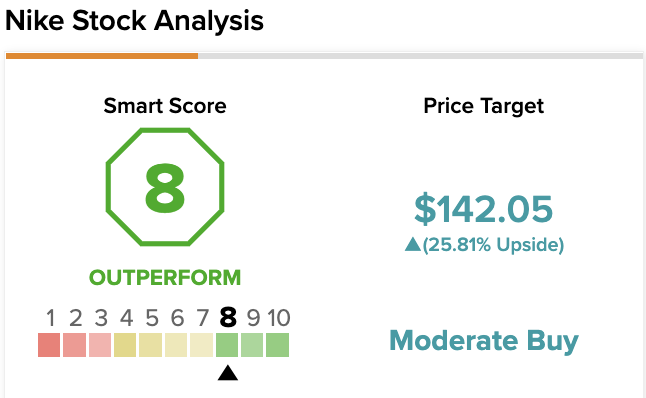Nike (NKE) is one of the world’s largest and most successful sports goods companies. It has created a global brand, representing far more than just a shoe company. The American sportswear firm is a symbol of success, innovation, and dedication, and is set to report earnings after the market closes on Monday, June 27. Now is the perfect time to check up on Nike and see why it remains a solid stock, and also why it could see some weakness in the short-run.
Discover the Best Stocks and Maximize Your Portfolio:
- See what stocks are receiving strong buy ratings from top-rated analysts.
- Filter, analyze, and streamline your search for investment opportunities with TipRanks’ Stock Screener.
Nike is a multinational corporation that manufactures and distributes sports apparel, footwear, and equipment.
Due to its strong brand, the world’s largest athletic apparel company has the reputation of an all-weather stock. However, shoppers may be more price-conscious now, given the effects of inflation on their income. Nike should not be affected too much by this mindset, since it targets a premium market.
We will have more clarity on this issue when Nike reports earnings. Of particular importance is the company’s forecast for fiscal 2023.
Although short-term headwinds persist, Nike has the wherewithal to weather nearly any crisis. However, the earnings report will clarify whether the time to invest is now, or not.

On TipRanks, NKE scores an 8 out of 10 on the Smart Score spectrum. This indicates a potential for the stock to outperform the broader market.
Nike Keeps Doing it
Nike’s success has been driven by its ability to provide consumers with a wide range of products that appeal to different demographics.
Even though the champion brand builder has been selective about who it partners with, sales have increased. This trend proves that the brand is powerful, and consumers remain loyal. Nike has an advantage because its customers can’t find their preferred products in retail stores. They usually buy those items from the website and similar products on Nike’s site. That way, Nike collects data on what customers want that it otherwise wouldn’t have been privy to if the customer shopped in-store.
Nike is a perfect example of a company that has learned to balance quality, affordability, and accessibility. The management is not afraid to make tough decisions to maintain a positive outlook for the business. Its direct-to-consumer sales in its latest fiscal quarter rose 15% to $4.6 billion as it cut retail partners and improved its digital offerings.
With Nike being a market leader in tough economic conditions, it can show its resilience as a company. During the COVID-19 pandemic, Nike focused on digital sales. Nike is one of the few brands that benefit from an online presence, even before the pandemic. But the company stepped on the gas in 2020. Nike announced plans to make major efforts to improve its online business. It forecasts that e-commerce sales combined with key partners can account for 50% of the company’s sales.
According to its latest quarterly earnings, the athletic apparel company’s digital business revenue is up to 26% of company revenues. The U.S. has seen a 33% growth in digital sales in just one year.
What Will Investors Look for in the Latest Earnings Report?
Not dissimilar to the broader market, Nike stock is down substantially year-to-date. Soaring interest rates and inflation affect wider market sentiment, and Nike is no exception. However, there are some company-specific factors that investors need to know about.
A big element in Nike’s lack of price momentum is its international footprint, which relies on China and Europe for growth. Although the earnings report is not out, it is fair to assume sales from these regions also faced a pinch due to supply chain issues and inflation rates. It might trigger people to buy more of Nike’s competitor’s clothing and gear, especially those of a more discounted variety.
This could hugely impact the sports apparel giant’s inventory levels. With people pressing pause on sales, Nike could end up with an inflated inventory level. It may prompt management to consider offering this inventory at a discount. If that happens, it will undoubtedly impact the company’s margins.
Investors must be careful when investing in companies. The forecast for the next fiscal year will give them a fair indication of where Nike is heading and what to expect. But these are the key areas that investors will look to analyze.
Wall Street’s Take
The sentiment on Wall Street is overwhelmingly bullish on Nike. The stock has a Moderate Buy consensus rating based on 15 Buys and seven Holds. NKE has an average price target of $142.05 per share, which implies upside of 25.81% from Friday’s closing price.

The Bottom Line on Nike
Nike is a company that has been around for decades and is remains successful today. It has a strong brand value and recognition, which helps it do well even during recessions and economic slumps. Nike’s key to success is its ability to be innovative with the times, while maintaining the values of excellence, creativity, collaboration, and respect.
Its digital business has given its operating model an added layer of resilience, which is why the company is doing well and will continue to do so in the future. However, before investing in Nike, it is better to wait for the earnings report and see where the sports apparel giant is heading next.
Read full Disclosure









